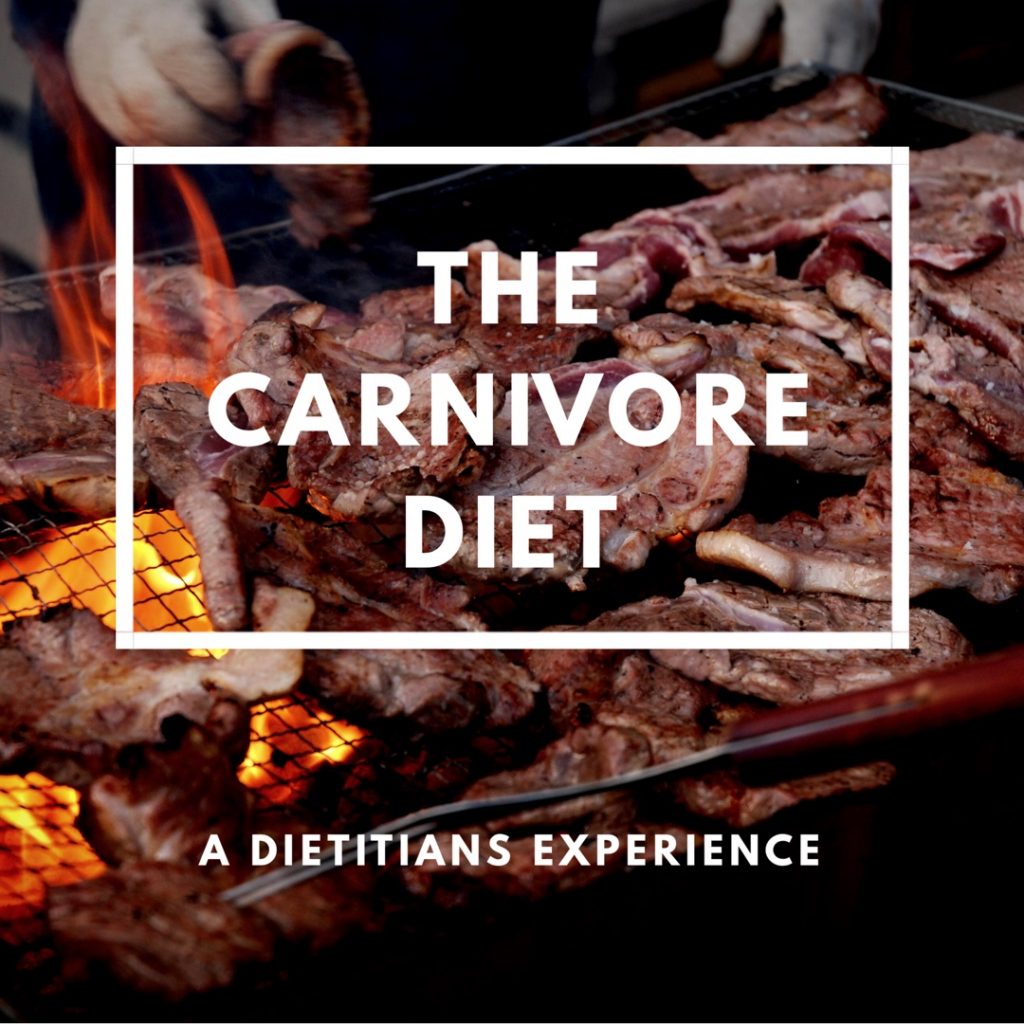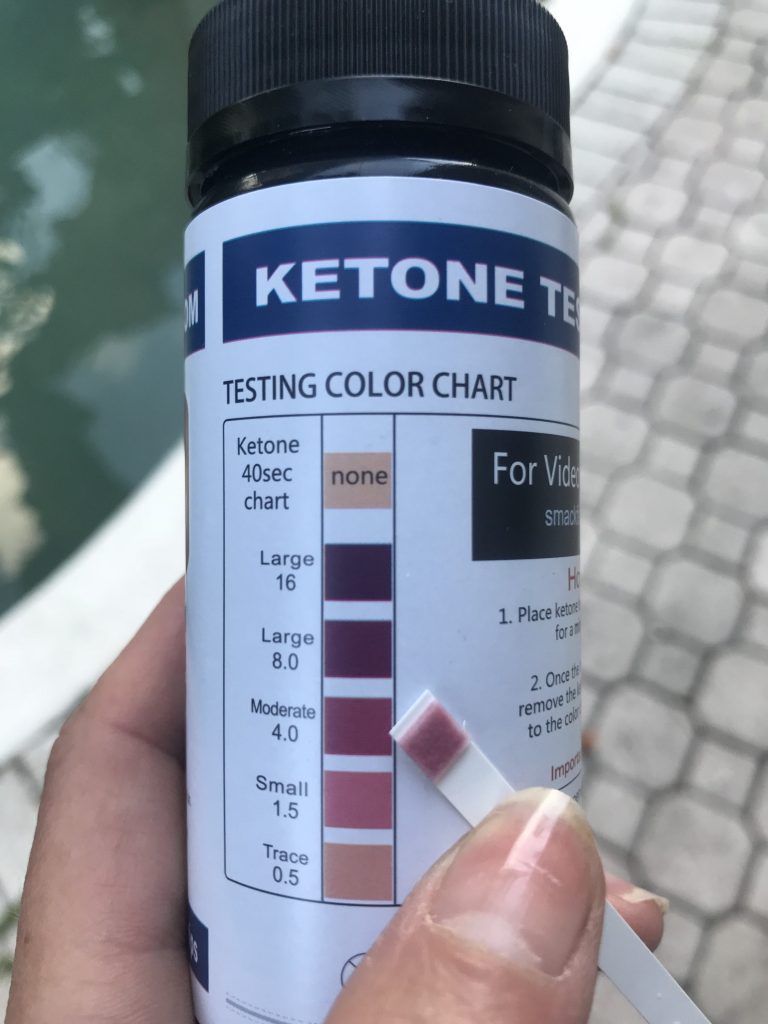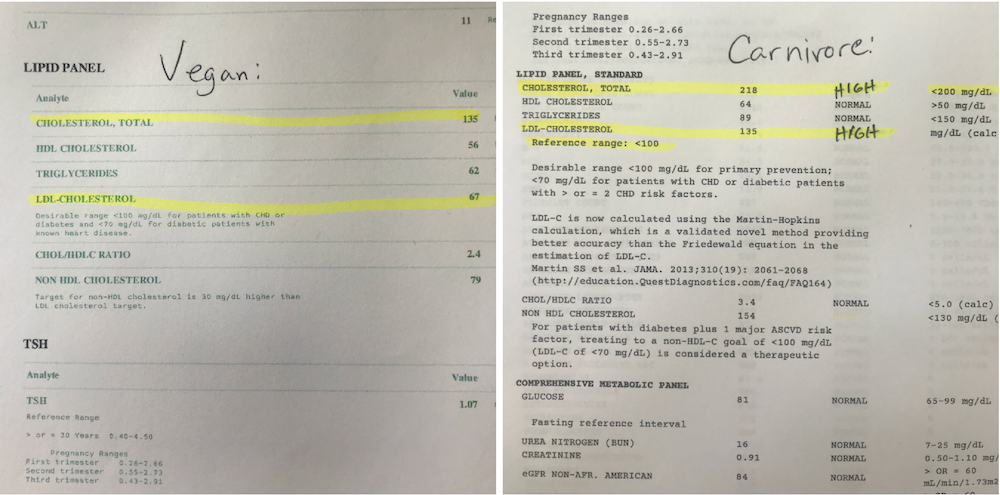
As a registered dietitian, it’s my job to help my clients figure out the best eating style for them. I try to get ahead of diet trends by experimenting with them myself and in turn help my clients to truly understand if these trends would be helpful or harmful. In this article, I cover what happened with my weight, cholesterol, shoulder pain, skin, energy levels, and more when I tried the carnivore diet.
What is the carnivore diet?
All meat. In it’s simplest form, the carnivore diet is beef, salt, and water. I included all poultry, fish, eggs, and a little cheese here and there. No vegetables, fruits, or grains.
Why would a registered dietitian do the carnivore diet?
As a registered dietitian, it is my job to stay on top of trends in the nutrition world. Instead of immediately dismissing a client when they ask about the ketogenic diet or intermittent fasting, I am not only able to speak to my clients from a professional perspective but also from experience. If a client is questioning whether they should try the carnivore diet or the vegan diet, it is beneficial for me to be able to meet them on a level playing field and discuss my experience, the pros and cons, and sustainability rather than just telling them to “eat a balanced diet.”
While many of colleagues have enjoyed following along and reading about these experiments, I have caught some shade from other dietitians saying that I am “promoting fad diets.” I want to be clear here: I am not promoting anything. I am simply doing the research, engaging in an experiment, and presenting my results. I would rather the public be getting their information from a professional than an insta-famous blogger with no science background who hasn’t read a study since their 2001 biology 101 class.
When faced with a “diet” question, most health professionals take a hard stance: “that’s not going to work for you.” However, the client is being inundated with the proponents of a certain diet telling them the opposite and sharing their experience. Their friend tried it and it worked, so why wouldn’t it work for them? Doing these experiments myself helps me to develop another layer of trust with my clients. I’ve been there and I’ve tried that. Let’s talk about it.
How did the carnivore diet become a thing?
One of the first people I heard promoting the carnivore diet was Dr. Shawn Baker, an orthopedic surgeon and athlete over 50, who is setting world records in indoor rowing while eating only steak and ground beef.
Mikhaila Peterson, the daughter of famous psychologist and author Jordan Peterson, claims that she healed her rheumatoid arthritis, depression, chronic fatigue, and skin conditions by cutting everything out of her diet except beef.
Seeing the benefits his daughter was experiencing, Jordan Peterson also adopted the carnivore diet and claims that his anxiety, digestive issues, inability to wake up in the mornings, psoriasis, and gingivitis have all disappeared. Dr. Peterson also lost a significant amount of weight, prompting people to start asking about his diet.
Are the ketogenic diet and the carnivore diet the same thing?
Both diets are extremely low carb and can put your body into ketosis (meaning you are using ketones for fuel instead of carbohydrates). Both are often paired with intermittent fasting or eating only 1-2 meals per day.
On the ketogenic diet, the goal is for at least 70% of your intake to come from fat, with a low to moderate protein intake and 5-10% of your calories coming from carbohydrates. On the carnivore diet, you do not limit protein. There’s not much “counting” involved because nothing you eat has carbohydrates.
The ketogenic diet includes plant-based fats like coconut oil, olive oil, nuts, and seeds. Healthy ketogenic diets emphasize eating lots of greens and non starchy vegetables. On the carnivore diet, all of that is off limits.
My experience
My goal was to eat only meat for 7 days. Meat is not one of my favorite food groups. In fact, it would probably be the easiest thing for me to cut out of my diet. From my previous bouts with keto, I was questioning whether I could even make it 7 days. I’m not one of those people that think: “yay, steak every day!”
I do have a gene polymorphism that causes me to metabolize fatty acids poorly, which may be why I haven’t previously done well with high fat diets. This is just one example of how your specific genetics play a role in how you should eat, as well as why nutrition is not a “one size fits all” science.
Day 1 was relatively easy. I did not want to drink water at all, which was weird for me since that’s usually all that I drink. I’m not proud of this, but I found a rogue Diet Coke hiding in the fridge and went for it. My craving for drinks with flavor continued throughout the week and I mostly relied on Vitamin Water Zero (since it’s sweetened with stevia and not sucralose) to get me through. My calorie level for the day ended up well below what I usually eat, mostly because I wasn’t super interested in the food that I could eat.

On day 2, I woke up super hungry and ready for breakfast, however I couldn’t stomach eating meat by itself. I immediately realized that eggs were going to have to be “allowed” on my version of the carnivore diet if I was going to make it through the week. I felt a lack of energy and focus so I took one of my go-to nootropics (a substance that boosts mental clarity and focus), Alpha Brain. That helped me get through my day. I tested my ketones via urine test strips and had moderate ketones. I did not feel great.
Day 3 and 4: the weekend. This was tough because a lot of my favorite weekend activities revolve around food. I love trying new restaurants, making a good cocktail and sitting by the pool, having a beer while watching football, or having friends over for dinner. I cook all my meals throughout the week, so eating out during the weekend is a treat. Most of the instagram accounts I follow are fellow foodies, dietitians, and local restaurants so I realized that I had to stay off social media for a few days to avoid temptation/moodiness and FOMO.
I did go to World of Beer on Sunday to watch football. I skipped the beer and ate chicken wings. Healthy, right?
Day 5: I felt like I was operating at a low intensity but I didn’t have any keto flu symptoms, cramping, extreme fatigue, or cravings. Sometimes I was in ketosis and sometimes I wasn’t. I lost about 6 lbs overall in those 5 days (most of it within the first day, due to water loss). More on that later. I started to miss fruit. RxBar sent me samples of their new almond butter single serve packets and I caved so I could try one.
At the end of most days, I didn’t even want to think about meat. However, I was always surprised the next day when I could wake up and throw meat and eggs in a pan and be totally fine eating it.
Day 6: I felt great and my energy levels were high, but that was probably more from coffee than anything else. I don’t want to rely on coffee for energy every day, and it’s technically from a plant, but it was one of the only things left I actually enjoy. That, and bacon of course. Yes, I know bacon is not the healthiest meat, but I got the least processed versions I could find and it was one of the only things I could stomach on a regular basis.
Day 7: I was moody all day and just “over it.” I had a frozen yogurt bar and almond butter after my carnivore dinner.
To see the videos of my experience, check out my instagram highlights.
Results
When you cut out carbs completely, you will lose weight quickly. Water weight. As soon as you eat carbs again, you will gain that water weight back. Those are the facts. That is why body builders cut carbs before a competition, to look as lean as possible.
There’s nothing magic going on here, it’s just science. Glycogen is the storage form of glucose, which is what your body uses as fuel when you eat carbohydrate. Every gram of glycogen in your body is bound to 3-4 grams of water. Without any carbs in my system, my body burned through my glycogen stores and the water attached to them. I did not get rid of 5 lbs of fat on my body by eating only meat for one day.
For whatever reason, the carnivore diet was a lot easier for me than keto. I think that my mistake doing keto was putting too much emphasis on the numbers and whether I was in ketosis or not when I should have just been focusing on the food. There is so little room for error on the carnivore diet. You are either eating meat, or you’re not.
I was also monitoring my skin and shoulder pain throughout the week. I have been dealing with a nagging shoulder injury for the past year and an odd rash on my face for the past few months. By day 2, I woke up with no shoulder pain and no rash and honestly thought, WTF?! Neither returned throughout the week. As a dietitian who does not want to promote this diet, that is hard for me to admit.
One possible explanation for the lack of shoulder pain is that I cut way back on Crossfit and did mostly low intensity strength training throughout the week. A reasonable explanation for the rash going away is that the carnivore diet is the ultimate elimination diet. If my body was sensitive to anything or if there was any food causing inflammation, I likely cut it out. Would I have the same results if I followed a more balanced diet including veggies but without sugar? Maybe. I had previously tried switching up my entire skincare routine to clear up the rash but nothing had helped. I kept everything constant during my carnivore week to avoid introducing any new variables. Another interesting thing I noticed was that my nails have never looked better or felt stronger.
After day 7, I added back in a limited amount of foods: vegetables, fruits, RXbars, and almond butter. I gained one lb back the first day and 2 lbs back the 2nd day. After that, I left for a trip to DC and was happy to be traveling without any food restrictions. If you can’t try the best food a place has to offer, whats the point of traveling?
Digestion (TMI)
One of the most common questions I got was if I was pooping or not. The simple answer? Nope. I went maybe 1-2 times the entire week. Normally if that was the case, my stomach would look pregnant and I would be extremely uncomfortable. The weird part about this was that I felt completely fine and I had zero bloating or gas.
Labwork

I had a hell of a time finding a way to get my lab work done without a doctors order. Having already used my one “well check” for the year, I was fully prepared to pay out of pocket. I did not, however, want to pay out of pocket for a doctors visit as well (plus try to get an appointment short notice) just to have them write me a script and walk out the door.
I ended up using healthlabs.com, where you can order your own lab work and pay via their site, print your order, then go to a local Quest lab to get your blood drawn. Health labs offers an entire vitamin and micronutrient panel, but it would have been an extra $849 on top of the $150 I paid for the thyroid, lipid, metabolic panel, and vitamin D.
I got my results within 24 hours. Everything was normal except my total cholesterol and LDL-C. Compared to my lab work after my vegan experiment, my LDL-C went up by 68 points.
Doesn’t that increase your risk for cardiovascular disease?
This is a complicated topic that is way beyond my ability to explain thoroughly, but I’ll try my best. If you really want to delve deep into the science, check out this excellent 9 part series on cholesterol from Dr. Peter Attia.
LDL is not actually a cholesterol molecule. It is often referred to as the “bad cholesterol” in an attempt to simplify a complex topic. However, LDL is a lipoprotein, a carrier for cholesterol, not cholesterol itself. LDL is the transporter that takes cholesterol directly into the artery wall, which is why we became interested in measuring LDL in the first place. The higher the LDL, the higher your risk for an artery clogging heart attack, right?
Well… it turns out that the LDL-C number that is measured in a standard lipid panel (the one that we all get every year) is not the best predictor for cardiovascular disease. Unfortunately, these tests are outdated. LDL-P (LDL particle number) measures the actual number of LDL particles and is a stronger predictor for cardiovascular events than LDL-C. The gold standard tests to measure particle size and particle number are the NMR Lipid Panel from LabCorp or the Cardio IQ Test from Quest Diagnostics. I was not able to order these tests on my own without a physicians order.
Healthlabs.com did offer a stand-alone apolipoprotein B (apoB) test (included in the 2 panels mentioned above), which as of right now, seems to be one of the single best metrics to assess heart disease risk. If I was going to continue this diet long-term, because of my elevated LDL-C, I would request an order from my physician to get the entire NMR panel or the Cardio IQ test to give me a more complete picture of my risk.
Final thoughts
In an instagram poll, I asked my followers if they would ever try the carnivore diet. 76% said no.
The limiting social aspect of the carnivore diet is what makes it unsustainable for me. I would never tell someone who has seen a reversal of depressive symptoms or arthritis to stop doing what works for them. For some people, the benefits may outweigh the social downfalls. For me personally, the extra 5 lbs of water weight is worth it if it means I get to continue trying new foods and restaurants, having friends over for dinner (and not just serving steak), and eating some of my favorite foods like smoothie bowls, almond butter, and avocado toast. My job is to know everything I can about food and I don’t think I could do that as well on such a limiting diet.
There are no modern studies investigating the effects of eating a solely meat-based diet, but I’ll bet the Beef Council and the Pork Board have got something in the works.
References:
The Atlantic: The Jordan Peterson All-Meat Diet
The Diet-Heart Myth: Why Everyone Should Know Their LDL Particle Number
The straight dope on cholesterol – Part IX
About the author: Megan Poczekaj, RDN, LD, is a registered dietitian nutritionist in Orlando, FL. She owns the private practice, Nutrition Awareness, where she teaches other entrepreneurs how to maximize their productivity and performance with nutrition. She is the author of the book The Optimized Life: A Nutrition Guide for Entrepreneurs and co-host of the Nutrition Awareness Podcast.
Disclosure: Some blog posts may contain one or more affiliate links. I was not paid by any of the companies above to review their products. All opinions are my own.
